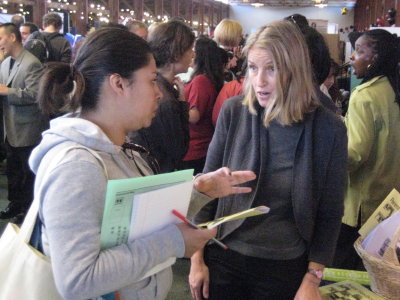When educators talk about their work to parents, they utter buzzwords that leave their audience in the dark. This “ed-speak” phenomenon is so prevalent, it should be considered an occupational hazard. And when district leaders try to explain where their schools and district stand, they are too often tongue-tied by jargon from the accountability zone.
Martin Kozloff, a sociologist from the University of North Carolina-Wilmington, has studied the creep of ed-speak in teacher training programs. He calls it “unmatched twaddle … unbelievable bilge … absolutely staggering nonsense.”
An article in the Los Angeles Times (8/16/2001) took aim at the perpetrators of what reporter Duke Helfand called “a blizzard of buzzwords.” Professor Kozloff argued that ed-speak serves a deliberate purpose: “It allows teachers and administrators to insulate themselves from scrutiny and maintain a grip on power.”
An education historian cited in this article, Jeffrey Mirel of the University of Michigan, said, “It’s a way to underscore the message that, I’m a professional, so give me your kid and leave me alone. All professional language is turf language.”
Some examples

From this Los Angeles Times story, consider the following hazards of a parent-teacher discussion of reading. “Take reading, perhaps the most important subject in school. Teachers engage their students in “phonemic awareness,” “decoding” “systematic, explicit phonics” and “word attack skills.” How can parents make sense of this festival of buzzwords?
And terms change quickly, making it tough for teachers, too. “They’re always changing the acronyms that are being thrown around,” said Shana Kensley, 25, a second-year kindergarten teacher in Lompoc, north of Santa Barbara. “It gets a little confusing.” Case in point: Students still learning English once were known as LEP (limited English proficient). Now they’re called ELL (English language learner).
What to do
The Los Angeles Times reporter, Duke Helfand, discovered Principal Jeff Carlovsky’s solution. ” … with more than 30 years experience, [he] keeps a jargon handbook on his desk at Cabrillo High School in Lompoc, just for those occasions when someone tosses him a zinger. Carlovsky recently spent five years working in the schools of Washington state. But he returned a stranger in a strange land, unfamiliar with the local dialect. Washington refers to attendance as FTE–full-time enrollment. California calls it ADA–average daily attendance. “I’m the first one to jump on the bandwagon and say, ‘We ought to get rid of the baloney,’ ” Carlovsky said. “I’d get rid of the 25-cent words, break them down into laymen’s terms.”
Some help translating ed-speak
It’s best not to speak this jargon at all. But it’s hard to avoid hearing it inside the K-12 world. When you encounter it, you may want some help translating it.
EdSource has also done a great job of defining California’s particular ed-jargon terms, including a separate dictionary of acronyms.
Diane Ravitch took a serious look at ed-jargon in her book, EdSpeak: A Glossary of Education Terms, Phrases, Buzzwords, and Jargon (2007), published by ASCD. But as an education historian and retired educator, she’s too close to the subject to see its uglier deformations.
And for fun, you might try this education jargon generator, built and shared by the generous founder of ScienceGeek.Net, Visalia educator, Mr. Allan.








